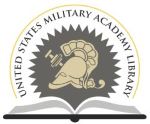Welcome to USMA Athena
USMA Athena is a secure digital service managed by the United States Military Academy Library to make the work of USMA scholars freely available, while also ensuring these resources are organized to preserve the legacy of USMA scholarship. The mission of USMA Athena is to showcase the academic impact and intellectual capital that has become synonymous with the celebrated heritage of educational prowess attributed to the Long Gray Line. Scholarship submitted to USMA Athena benefits from added visibility and discoverability via Google Scholar in addition to the use of persistent URLs that will provide enduring access to the work over time.
Recent Submissions
Item Bend But Do Not Break Shaping the Future of the All-Volunteer Force(Oxford University Press, 2026-01-31)Item Suboptimal Selective Service: An Analysis of the Obstacles to Selective Service Reform in American Political Institutions(Journal of Strategic Security, 2021)Expanding mandatory selective service registration in the United States to include women would seem to be good public policy that increases national security and reduces gender bias. Despite the recent recommendation of a congressionally-mandated commission, recent efforts to implement this important reform have repeatedly stalled. Why? In this article, we explain the failure of selective service reform through the lens of American political institutions. Neither the composition of the Supreme Court, nor the institutional incentives facing legislators, are conducive to movement on this issue. Building on the legislative entrepreneurship literature, we argue that recent trends in congressional representation and the adoption of new issue framings are the most likely factors that will increase the probability of selective service reform. The absence of selective service reform in the United States reveals important facts about agenda-setting in defense policy and how political institutions shape the relationship between the public and the military.Item Patrons and Personnel: The Foreign Determinants of Military Recruitment Policies(2021)Why do some states develop conscript armies, whereas others rely on volunteers? Most theories of military design describe domestic elites as making decisions based on rational security demands or cultural understandings of what a military should look like. Contrary to these explanations, many states faced with the challenge of building a military are dependent on powerful military patrons with strong beliefs about how to design their clients’ militaries. When states that are building new militaries have foreign military patrons, they are likely to emulate their patron’s recruitment practices. Patrons with sufficient interest and will to engage in security force assistance use their influence to shape recruitment practices in new or postconflict states. This article describes the dynamics of military patronage as they relate to recruitment decisions and finds support for the argument using both original quantitative data and a brief case comparison.Item Divided loyalty: Are broadly recruited militaries less likely to repress nonviolent antigovernment protests?(Journal of Peace Research, 2025)This article tests whether social distance between the military and society leads soldiers to refrain from violence against protesters, and how that expectation affects the regime’s decision of whether to deploy the military in the first place. In contrast with previous research that primarily examined aggregated protest campaigns and often in geographically limited samples, this study is conducted at the micro-level using daily event data. It employs the Integrated Crisis Early Warning System dataset to identify more than 36,000 protest-day events in 168 countries between 1997 and 2015, coding whether and how soldiers responded. In addition, this study also demonstrates theoretically and empirically the need to differentiate conscription from the military participation rate as measures of social distance. Contrary to expectations, it does not find evidence that conscription results in a lower likelihood of violence or deters the regime from deploying soldiers to put down protests, and it finds only weak evidence that higher military participation rate results in a lower likelihood of violence. It also finds that conscription increases rather than decreases the likelihood of soldiers being deployed against protests.Item The Legality of Electromagnetic Interference with Maritime Autonomous Vehicles(Routledge, 2024-12-31)With the growth of drones and their proven effectiveness in warfighting, parallel efforts have emerged to develop counter-drone capabilities. One such capability is electromagnetic interference such as radio jamming to disrupt or deny access to radio frequency signals or spoofing by transmitting false signals. Greater use and sophistication of counter-drone electronic capabilities has the potential to ensure safety of flight and navigation for sovereign vessels on the high seas against uncrewed systems, such as remotely piloted and autonomous vehicles in international air space, on the water’s surface, and within the water column. In addition, electronic capabilities have the potential application as a means of exercising the coastal state’s jurisdiction and control over these systems when passing through its territorial waters. On the other hand, these systems could themselves generate electromagnetic interference that threatens maritime security. Counter-drone capabilities could also lead to unlawful restriction of navigational rights. This chapter considers the legality of electromagnetic interference with the navigation and communication of uncrewed systems to ensure safety of flight and navigation in international waters or in the exercise of enforcement jurisdiction under international law. It does so by examining the general obligation of due regard on the high seas, the coastal state’s rights of protection within its territorial waters, and in the context of military vehicles, its obligations under general international law relating to the prohibition of the use of force.
Communities in USMA Athena
Select a community to browse its collections.
